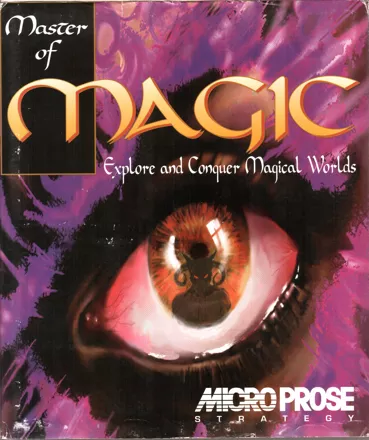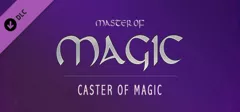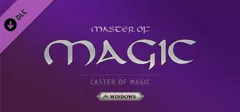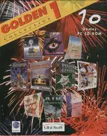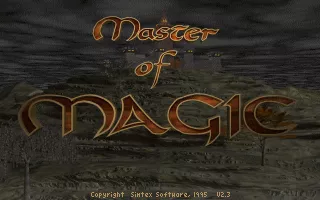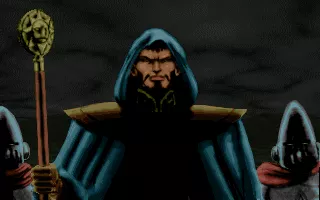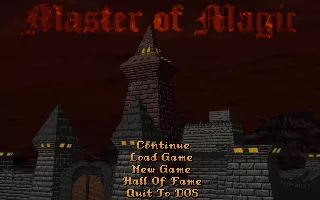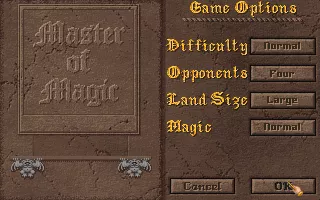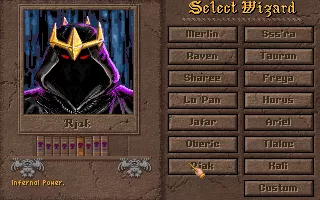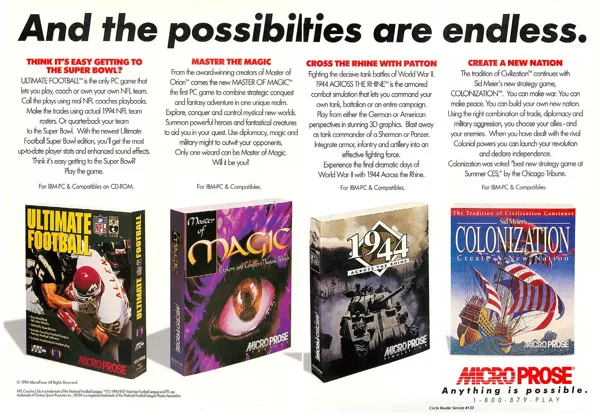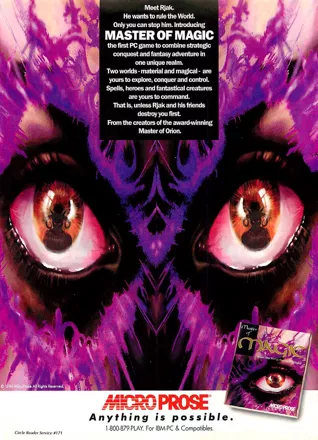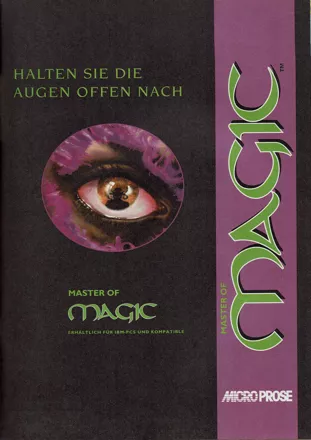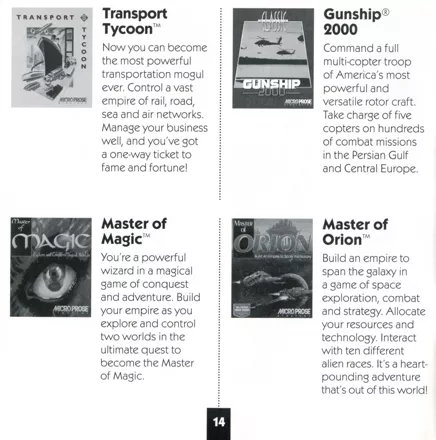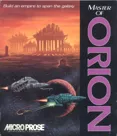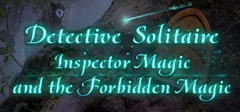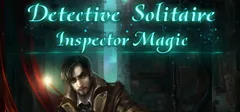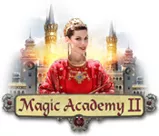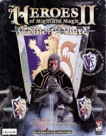Master of Magic
-
 Master of Magic
(1985 on
Commodore 64, 1986 on
ZX Spectrum)
Master of Magic
(1985 on
Commodore 64, 1986 on
ZX Spectrum)
-
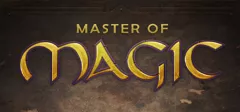 Master of Magic
(2022 on
Windows)
Master of Magic
(2022 on
Windows)
Description official descriptions
The plot of Master of Magic is to become the dominant wizard on two 'planes' of existence, the normal Earth-like one and the fantasy based plane "Myrror". You can do this by destroying your competing wizards (up to 4 computer players) or by casting the Spell of Mastery.
Game play is carried out in a 2D top down perspective. You move your armies around the board, fighting monsters to get treasure, and more importantly 'nodes'. Once you control a node you can summon a spirit to meld with the node and gain mana from it. You also must build up your cities so you can support and train your army. City management is very much like Civilization. You also must allocate your mana for use, or research. You must research to learn new spells. You can do battle with the enemy in a quasi-isometric perspective or you can have the game simulate the battles.
The game ends when your home tower is destroyed; you banish all the other wizards (by destroying their home tower) or someone casts the Spell of Mastery.
Spellings
- シヴィザード 魔術の系譜 - Japanese PlayStation release (Japanese spelling)
Groups +
- Console Generation Exclusives: PlayStation
- Fantasy creatures: Dwarves
- Fantasy creatures: Elves
- Fantasy creatures: Griffins
- Fantasy creatures: Halflings / Hobbits
- Fantasy creatures: Orcs
- Fantasy creatures: Trolls
- Fantasy creatures: Unicorns
- Games with randomly generated environments
- Master of Magic series
- Powerplus releases
- Protagonist: Female (option)
- Sound Engine: AIL / Miles Sound System
Screenshots
Promos
Videos
Add Trailer or Gameplay Video +1 point
See any errors or missing info for this game?
You can submit a correction, contribute trivia, add to a game group, add a related site or alternate title.
Credits (DOS version)
48 People (46 developers, 2 thanks) · View all
| Design | |
| Programming | |
| Art | |
| Composer | |
| Music Producer |
|
| Sound Effects |
|
| Marketing - Product Manager | |
| Marketing - Packaging | |
| Producer | |
| Art Director | |
| Quality Assurance Lead | |
| Manuals - Writer | |
| Manuals - Editor | |
| Manuals - Design & Layout | |
| [ full credits ] | |
Reviews
Critics
Average score: 79% (based on 19 ratings)
Players
Average score: 3.9 out of 5 (based on 121 ratings with 11 reviews)
The Good
The game has incredible depth of play. The sheer number of inventive and interesting spells that can be researched and used transforms what would otherwise have been a mediocre 4x game into something classic. At the start of each game the player is able to choose what kind of spells they would like to concentrate on (life, death, chaos, nature, sorcery), what special powers they will use (alchemy, warlord etc) and what mythical race they will command (Elves, Dwarves, Humans, and about a dozen others), each with their own units and buildings, abilities and handicaps. For instance the Dark-Elf race can build the special Warlock unit, but have a higher rate of rebellion. The Klackon race is highly productive but cannot build Universities to advance your spell research. The races are much more specialised than they are in the Civ titles, and make a great difference to how you play the game.
This combined with customisable maps and random opponents means that each game is very different from the last. Add to that the traditional Civ-like exploration, war/diplomacy and city building and you have a very addictive game with loads of replayability.
The Bad
The graphics were adequate at the time it came out, and today it's looking badly dated. Really in need of a revamp. The diplomacy is pretty much redundant as every opponent wants to wipe you out. They will stay hostile and defiant even when they have one tiny unit left and are facing your army of dragons. And it can be buggy unless you treat it just right, though that could be a result of running it in a Dos-box environment.
The Bottom Line
Transforming a game like Civilization into a fantasy realm is not as easy as it seems. But MoM managed to get the balance right and retain all the addictiveness. If you like classic 4x games like Civ and Master of Orion etc, then you have to give this a try. Tons of interesting spells, powerful mythical units to fight with, and interesting realms to explore and conquer. Despite being rather old and having poor graphics, it has so much gameplay that it will still keep you hooked in this day and age.
DOS · by StJude1 (4) · 2008
A classic for sure, but with some issues
The Good
First off, I grew up with this game. I have played this game probably more times than I care to admit, and I still find it infinitely entertaining. The fact that I also love Civ games probably didn't help matters either.
But really, that's what this game comes down to. It's a Civilization game but with magic. There are very few turn based games out there that allows you to play an empire building game with this level of freedom.
One of my personal favorite parts of this game though? The exploration and the heroes. Sure, fighting other wizards is fun and all, but sending your heroes to go around and exploring dungeons and what not? For some strange reason, it made the game for me.
I especially like the fact that you can have your multiple heroes, and deck them out from head to toe in full battle gear that you crafted yourself.
The addition of spells also means that your tactical choices are not as simple as you would with most Civ games. Civ games have you discover techs to unlock units. In MoM, your spells unlock not units, but tactical options.
The Bad
Unfortunately, the game is not without it's flaws.
For starters, there are a staggering number of bugs in this game that render a large number of powers and abilities simply useless.
second, there was little in the way of game balancing and proper AI control. The AI will know how to overwhelm you with forces (by basically cheating like crazy just like any Civ-like game), but they won't know how to combine them to make them more effective. (Or rather, how to undo some tricks that you might employ.)
The end result is that you'll have situations where a single nightstalker (the night elf unique unit) defending the city is more than enough to hold off a 9 stack unit, as the AI does not know how to handle an invisible unit that is intrinsically invisible. So it will sit around until the clock runs out and end the battle in a stalemate.
It is also the reason why late in the game while you're running with storm giants and the like, your foe could still be sitting around with spearmen.
And then we have the game balance issue. Races are not created equal, so god help you if you picked the kracken or the lizard folk as your starting race, you'll be spending the rest of the game trying to get another race that doesn't suck quite as much.
But even more infuriating is the diplomacy model. Or rather, the lack of it. Sure, you can try to create treaties with other wizards. but quite honestly, their personalities are so volatile that said union will probably dissolve in a matter of rounds in a orgy of schizophrenic messages. There is no point to it. And really, the only effective purpose of diplomacy in this game is to just make a treaty so that they don't attack you for now. Can't say how long that will last though, as these computer wizards seem to have a wild mood swings that makes a bipolar clown look sane by comparison.
The Bottom Line
Civilization in a fantasy setting
DOS · by Elliott Wu (40) · 2008
An extremely innovative game typical of the old MicroProse style.
The Good
Everything, starting with the super addictive gameplay, wonderful graphics and renders, the research tree, the battles, the strategy... everything indeed!
The Bad
It's simply marvellous - what's not to like?
The Bottom Line
One of the best games ever invented.
DOS · by Tomer Gabel (4534) · 1999
Discussion
| Subject | By | Date |
|---|---|---|
| Dragonsword has moved to Realms Beyond | Hans Noe | Oct 23, 2010 |
| MoM unofficial patch v1.40 | kyr ub (1) | May 16, 2010 |
| Active fan site at dragonsword.com | Hans Noe | Apr 24, 2010 |
Trivia
References
One of the merchants may try to sell an item called "idspispopd". This is a cheat for Doom.
Release history
The original game had an onslaught of bugs that almost prevented playing. MicroProse released a patch and later a completely new version of the game (which had a different manual and disc).
Unofficial patch
There is an fan-made, unofficial patch (v1.40) that focuses on the correction of many bugs still left in the 1.31 version and tries to improve the game's AI performance. The download link can be found in the related links section.
Awards
- Computer Gaming World
- November 1996 (15th anniversary issue) – #141 in the "150 Best Games of All Time" list
- November 1996 (15th anniversary issue) – #13 Most Rewarding Ending of All Time
- May 1997 (Issue #154) - Introduced into the Hall of Fame
Information also contributed by Andrew Grasmeder El-ad Amir, and kyr ub.
Analytics
Related Sites +
-
Help Site for Master Of Magic
This is an interactive guide on Master of Magic. For those who do not have the manual paper because they download abandonware version of this video game. -
Master of Magic: Hero Page
A site dedicated to everything about heroes in Master of Magic, including cheats, oddities and descriptions. -
Sector 5, Ratai's Realm
Master of Magic Online Guide. Has other things like chat rooms and custom wizard submission.
Identifiers +
Contribute
Are you familiar with this game? Help document and preserve this entry in video game history! If your contribution is approved, you will earn points and be credited as a contributor.
Contributors to this Entry
Game added by Tomer Gabel.
Windows added by Picard. PC-98 added by Trypticon. Linux added by Lugamo. PlayStation added by Yanis Lukes.
Additional contributors: Andrew Grasmeder, Kalirion, Laey'zur Tiberius Hawke, Thibault Droulers, 6⅞ of Nine, Cantillon, Patrick Bregger, Plok, Yanis Lukes.
Game added August 10, 1999. Last modified November 5, 2024.


